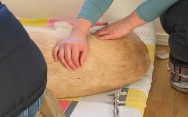Bird flu H5N1 virus has been confirmed to be present in commercial flocks in many states, and in backyard flocks as well as wild birds in Montana. Pets can be infected, and cats are especially susceptible. Pets who go outside can be directly exposed to bird flu by eating infected birds, or from exposure to the virus in an infected environment. There have been several indoor cats that have died of avian influenza by eating raw diets containing duck, turkey, or chicken that were contaminated with the virus. Barn cats have died after consuming unpasteurized milk. Avian influenza is contagious among cats, spread in respiratory and GI secretions. Humans can be infected by drinking raw milk, eating undercooked poultry and eggs, and inhaling dust or droplets from an infected environment, or from exposure to the saliva, urine and feces from infected birds and mammals, including cats. Wash your hands!
Signs of avian influenza in cats include: Fever, lethargy, heavy discharge from the eyes and nose, respiratory distress, and neurological issues like incoordination, blindness, and tremors. Symptoms occur between 2 and 10 days after exposure, and the disease in affected cats can rapidly progress to death. (We also have to consider rabies as a differential for cats with neurologic signs, particularly if they have not been vaccinated.)
How do we prevent cats from getting bird flu? Don’t feed raw commercial diets, or raw eggs, unpasteurized milk, or raw or undercooked poultry. Don’t allow cats to hunt or kill wild birds, and keep them away from livestock and poultry.
There’s not a vaccine for bird flu, and there’s no treatment except supportive care.













